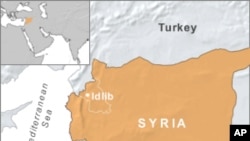Thousands of anti-government protesters took to the streets across Syria following Friday prayers, in what organizers are calling the "Friday of the Free Army." The government crackdown goes on with the United Nations estimating that 3,000 people have been killed since protests began in mid March.
Anti-government protesters carried banners calling for help from the international community and chanted slogans against the regime of President Bashar al-Assad across Syria Friday. Videos on opposition websites showed demonstrations in more than a dozen towns and cities.
Activists say at least 11 anti-government demonstrators were killed after Syrian forces fired live ammunition at opposition rallies in areas that include Damascus suburbs. However, Syrian government television showed video from several areas where it said there were no significant demonstrations after Friday prayer services.
The protests were called in support of the "Free Syrian Army" - hundreds of Syrian soldiers and officers who reportedly have deserted from the national army of 400,000 in recent months.
Friday's crackdown on dissent occurred the same day that U.N. human rights officials said the death toll from seven months of anti-government protests in Syria had topped 3,000.
About 100 people have died in the last 10 days alone. U.N. High Commissioner for Human Rights Navi Pillay said Syria's violent repression of dissent could drive the country into full-blown civil war.
Peter Harling, who works for the Crisis Group in Damascus, says it's unclear whether Kurdish protesters will take to the streets in large numbers following the assassination of one of their top leaders last weekend:
"The big question today is to what extent the Kurdish population in Syria will join the protest movement. Will it throw its lot in with the protest movement and go for broke, or show the considerable restraint it's shown over the past few months?" he asked.
Syria expert Joshua Landis, who teaches at the University of Oklahoma, says Syrians may soon face additional hardship from growing international sanctions.
"The economy is going to face, obviously, deep hardship as [economic] sanctions begin to bite in November on energy. But sanctions are not the salvation for the Syrian opposition. Economic sanctions are a form of collective punishment. They will definitely help de-legitimize the government, but they're going to weaken the people as well, because it's the most vulnerable who get hit hardest by sanctions," he said.
Landis says he expects the Syrian army is not likely to break up, as the opposition hopes, because Syria's ruling elite belong to the minority Alawite sect, whose members form the backbone of the officer corps.
Thousands Protest in Support of Syrian Army Defectors




